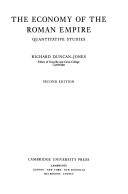| Listing 1 - 2 of 2 |
Sort by
|

ISBN: 0521287936 9780521287937 Year: 1982 Publisher: Cambridge: Cambridge university press,
Abstract | Keywords | Export | Availability | Bookmark
 Loading...
Loading...Choose an application
- Reference Manager
- EndNote
- RefWorks (Direct export to RefWorks)
Rome --- Economic conditions --- History --- 34 <37> --- 330.937 --- Romeins recht --(algemeen-voor verdere onderafdelingen z.o:{341 <37>}; {342 <37>}; {343 <37>};{347.1 <37>}; {?347.2 <37>: 347.6 <37>}; {347.62 <37>} --- Social sciences Economics Roman Empire --- 34 <37> Romeins recht --(algemeen-voor verdere onderafdelingen z.o:{341 <37>}; {342 <37>}; {343 <37>};{347.1 <37>}; {?347.2 <37>: 347.6 <37>}; {347.62 <37>} --- Rome - Economic conditions - 30 B.C.-476 A.D. --- Rome - History - Empire, 30 B.C.-476 A.D.
Book
ISBN: 3792701510 9783792701515 Year: 1972 Volume: 9 Publisher: Bonn: Rheinland-Verlag,
Abstract | Keywords | Export | Availability | Bookmark
 Loading...
Loading...Choose an application
- Reference Manager
- EndNote
- RefWorks (Direct export to RefWorks)
Inscriptions, Latin. --- Inscriptions latines. --- Inscriptions latines --- Rome --- Histoire --- Sources
| Listing 1 - 2 of 2 |
Sort by
|

 Search
Search Feedback
Feedback About UniCat
About UniCat  Help
Help News
News